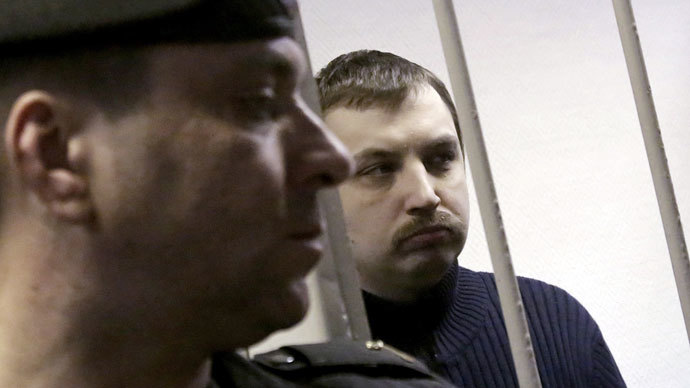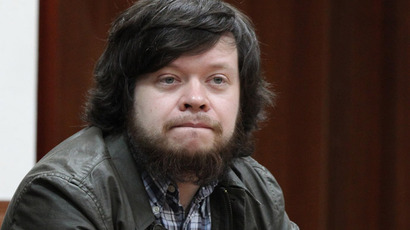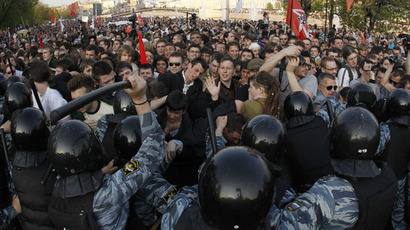Compulsory treatment in psych ward ordered for convicted Bolotnaya protester

A Moscow court has found a participant of 2012 street protests guilty of rioting, but did not issue a prison sentence - sending the convict to a closed psychiatric ward instead.
According to the verdict of the Zamoskvoretsky District Court, 38-year-old Mikhail Kosenko was found guilty of taking part in mass unrest and of behaving violently towards a representative of the authorities, crimes that can carry up to eight and 10 years in prison respectively. Both offences were committed on May 6, 2012, during the so called Bolotnaya Square riots – clashes with police during a thousands-strong rally against alleged violations during the 2011 parliamentary poll.
According to prosecutors, during the unrest Kosenko punched and kicked an officer from the OMON riot police squad.
However, the court did not send Kosenko to prison. Investigators established that he is officially disabled due to mental illness (continuous sluggish schizophrenia, according to Russian mass media) and has been registered with a local psychiatric dispenser for about 12 years. The court has requested an official evaluation from the State Institute of Forensic Psychiatry and experts agreed that during the riots Kosenko could neither fully comprehend his actions nor understand their danger to others.
As a result, the judge ordered him to be sent to a closed psychiatric ward for treatment until the doctors in the ward deem him healthy enough for release. The decision was in accordance with the prosecutors’ request. The defense attorney insisted that his client was not guilty on all counts and promised to appeal the verdict.

The decision caused a wave of protests in the Russian and foreign mass media and social networks. Several dozen people picketed the court building on the day the verdict was announced and police had to interfere, dissolving the rally and briefly detaining nine of its participants who had lit flares.
Veteran of the Russian Human Rights movement, Lyudmila Alekseyeva, of the Moscow Helsinki Group promised to get Kosenko out of the asylum.
The leader of the pro-business political party Civil Platform, billionaire Mikhail Prokhorov, blasted the court verdict in press comments saying that the decision to send someone to a closed asylum must be verified by independent psychiatric expertise “recognized by both the participants of the case and the community.”
The defense lawyers noted in press comments that the verdict in
its current form deprived their client of the opportunity to be
amnestied. Earlier, Lower House MPs suggested introducing a bill
on amnesty that could cover all Bolotnaya cases and release those
who were already sentenced and those who were still on trial.
At the same time, deputy head of the Forensic Psychiatry Center,
Yevgeniy Makushkin, told the Interfax news agency
the patient can be released after a general test. This happens
after six month in the asylum or earlier if doctors request a
halt to treatment. Makushkin also said that there are no armed
guards in ordinary psychiatric wards, the type Kosenko will be
sent to. All patients are kept together – those whose
treatment was ordered by the court and those who undergo the
process voluntarily.
Kosenko pleaded not guilty to all charges and also asked the court not to recognize him as mentally ill and not to order compulsory treatment.

The verdict was the third within the so called Bolotnaya Square Case.
Immediately after the riots Russian police and the Investigative
Committee (a federal body dealing with particularly resonant
crimes) instigated criminal cases against 26 people suspected of
mass unrest and violence against representatives of law
enforcement bodies. Two people have already received prison
sentences of 2.5 and 4.5 years respectively. Eleven more people
are currently on trial and other separate cases are still at the
investigation phase.














